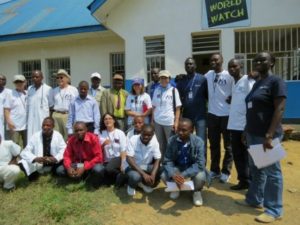But as long as we all spent working on this amazing project, I don’t think I was quite prepared for what it would be like to see it in person.
Years of conflict and insecurity have eroded any of the minimal healthcare system that existed before Congo’s long decades of war. This insecurity, frequent and persistent displacement, and a total lack of government services — and the inability to access even basic care that results — means that Congo has a horrifically high infant mortality rate and maternal mortality rate. Add to that the extreme levels of sexual violence, and you have an epidemic destroying not only women, but, through the destruction of their bodies, entire communities.
A woman at the Center gave birth today to a baby born eight weeks premature. The baby and the mother are both healthy; the prognosis is good. Without the care of this Center, that surely would not have been the case.
Hundreds of women have already accessed the Center since it opened last year. Some deliver their babies under normal circumstances, but the vast majority requires serious medical intervention and surgery — none of which was available before. Last month, triplets were born—healthy. That’s a feat even under the best circumstances. Many of these women, without medical intervention, would have lost either their babies’ lives or their own.
Hundreds more women have also accessed the Center for rape treatment and counseling. The Center is deliberately billed here as a reproductive health complex, so the women who are not prepared to state publicly that they’ve been raped (because of the stigma they may face from their families or community) have the cover they need to access critical treatment following their rape — and are even assisted, if they desire, with prosecution of the crimes committed against them.
It was moving to visit Chambucha alongside Irvin Kintaudi, board member of the Dillon Henry Foundation and member of our delegation. Their contribution helped the Center come to fruition. In honor of that support, there is a plaque up in a surgical room which reads, “Dillon Henry’s spirit traveled the oceans to help the women of Chambucha.”
For me, this trip so far has been a study in contrasts — how far we’ve come in the five years since I was last able to visit. Back in 2009, our big discussion was how to treat rape survivors, how to support them in rebuilding their lives away from the families that had shunned them. But now, everywhere we go, the discussion is about how far communities have come in fighting that stigmatization to begin with, in pushing for gender parity, in supporting fundamental rights and in establishing security for women and girls.
There are girls demanding from their families that they be allowed to finish school before getting married — a huge step for them, and an even bigger step for the traditional families they have grown up in. And today we met a man, the local traditional chief from Chambucha, who said that he realized (through the education programs being run via our Center) that the way he and his fellow men were treating women was “crazy” (his words, not mine). He has been helping to facilitate community conversations with men and between men and women, sensitizing them to gender-based violence (GBV) issues and women’s rights. He told us he used to just order his wife around, but now he asks for her help in making decisions and listens to her opinions. “She is very proud of my work,” he said (no kidding, I thought). He told us that he and the men in his community used to treat women the way they did unconsciously – that this was just the way women were to be treated. But now he is conscious, and his community is conscious, and he will continue to work for real change.
I’m bursting with pride at how far we’ve come in five short years, and it’s only our first full day in Congo. I’m so excited to see what more this trip has in store for us all — and dreaming of how far we can go in our next five years. With our partners, it feels like the sky’s the limit.

This post also appears in The Jewish World Watch Blog: One Life at a Time, hosted on the Jewish Journal’s website.


